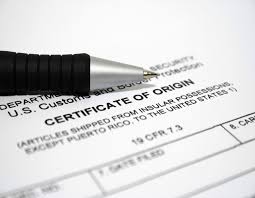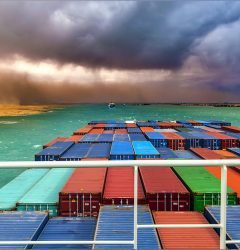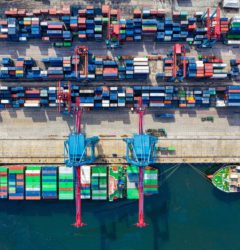27 Nov

A certificate of origin is a document used in international trade. You might come across it as CO, which has the same meaning. The exporter is most interested in this valuable document because it declares the official origin of the goods.
In short, the CA confirms that the contents of a consignment guarantee that goods purchased, manufactured, or processed in the same country are fully purchased. Each country must know the true origin of the goods when they are imported in order to calculate the value for customs duties and to determine whether they are legally transported to the destination.
The important thing here is that the origin of the product comes from the country where it was manufactured. It does not apply to the country from which the goods are to be transported to the final destination. This moment is slightly misleading, so you should be familiar with it. If the production process of one product takes place in two or more different countries, then there is another catch. Then the country of origin is considered to be the one in which the last word or economically justified process takes place.
Usually, when determining the country of origin, you can also be guided on a percentage basis. If 50% of the cost of producing goods is made by one country and the “national wage” is more than 50%, then that country is originating.
There are two main types of certificates of origin. The cameras decide what kind of certificate to issue based on the country of origin. The types of certificates are as follows:
- Preferential Certificate of Origin – is a certificate stating that the goods have privileges. This means that they are subject to reduced rates and other export preferences in some countries. This species is rarer. It is possible to require commanders to comply with letters of credit, foreign customs regulations, or the request of the buyer
- Non-Preferential Certificate of Origin – these are also called “ordinary certificates of origin”. Mostly they are issued. They indicate goods that are not subject to preferential treatment. It depends on the country of origin of the goods
Why is the certificate of origin so important?
The certificate of origin plays an extremely important role in the transport of any goods between two countries. It is valid as proof of the country of origin in which the goods were manufactured. It is important to be well-defined without any manipulation attempt.
Once it is clear where the goods originate from, the levying of duties or the exemption and use of preferences for the goods is very easily determined. In addition, the right to import goods is very important – some goods are banned and this will impose serious penalties if such information is found. That is why there are many stakeholders in the process of international trade and disclosure of the true country of origin of the goods. Consumers and officials involved in transportation wish to be aware of the origin of each good.
In most cases, the buyer only needs the certificate issued by the local chamber of commerce. However, he is sometimes entitled to and insists on, the Generalized System of Preferences (GSP) set up by the export advisory bodies of the countries concerned. When issuing the certificate of origin, a copy of the commercial invoice shall also be made and shall be certified by the said authorities.
When is a certificate of origin required?
A compulsory requirement for a certificate of origin arises at the time the goods are exported from a country. Any trader who chooses to operate in foreign markets must comply with this requirement. There is no need for a certificate to be transported and shipped to neighboring cities or within the country.
Like any other document, the certificate of origin imposes some rules. The unpleasant thing is that each country has different requirements and the importer in the recipient country should be aware of them:
- There are countries that are satisfied with the Declaration of Origin. It can be printed on the company letterhead. This is quite enough for some places
- In other countries, there are much stricter rules – the certificate of origin must be notarized. This must be done by a local chamber of commerce and legalized by the commercial department of its own consulate. You will encounter this whole process in many countries in the Middle East.
Who issues the Certificate of Origin?
The issuer of the certificate of origin is the Alliance. The organization produces so-called COOs for products that are made in the United States. Otherwise, the document is invalid. It has already become clear that it certifies the country of origin of the product or products concerned.
This is necessary if the foreign country or the importer has requirements for issuing the CO. The document is extremely important for customs because it determines whether goods are preferential or not. If they are not, the duty due on the value of the goods on the receipt must be calculated.
Need US Certificate of Origin information?
In the case of the US exporter and the importer of products to some countries, a certificate of origin is required. You need this kind of document most often for product delivery destinations to:
- Albania
- Austria
- Argentina
- Bolivia
- Belgium
- Germany
- Greece
- Denmark
- Ireland
- Italy
- Spain
- Canada
- Kuwait
- Mexico
- United Kingdom
- Finland
- France
CO may be required for several different reasons. They are:
- In the presence of such provisions concerning this contract for the carriage of international consignments
- In case of a change in the value of the duty
- In treating the consignment as preferential (this requires different treatment of the tariff, ie there are some reliefs regarding the origin of the cargo)
- In order to check the country in which the goods were made. Whether or not a certificate of origin is required is the type of goods and their destination.
Country of origin application is made for products originating in the USA or Puerto Rico. There are many restrictions on the number of products specifically imported into the US or manufactured there. Use NAFTA Central for destinations in Canada and Mexico. However, this is the case if the products originate in North America. The stock description and amounts must be identical to those on the invoice.
Do you need a certificate of origin for export?
A certificate of origin is essential in the export of goods to another country. It is a document accompanying the goods. It certifies the country of origin of each type of product contained in the consignment. It is confirmed that the document was correctly drawn up and with the correct particulars, signed by the exporter’s agent. Therefore, it is legally relevant and the responsibility is assumed in identifying incorrect information.
There are two forms of a certificate of origin:
- It may be as a statement attached to the commercial invoice in support of the list of countries of origin by article.
- Alternatively, it may take the form of a separate form or letter certifying the country of origin indicated in the Commercial Invoice
Conclusion
As you have seen, the certificate of origin is an important element in trade between the two countries, but there is no single issue standard anywhere. World trade does not impose any standard. However, one thing is clear – it contains at least basic information about the product delivered, country of origin, customs code, exporter, and importer.
For some products, there are some preferences and exemptions from duty, while other countries do not have similar regulations. The exporter should be aware of the specific border control requirements in the country of delivery. The specific requirements depend on the goods exported to their destination (ie the destination matters). The exporter must document the necessary information, inform the CO of the Chamber of Commerce, and send the prepared shipment form (according to the type and quantity of goods to be shipped to the importing country).




